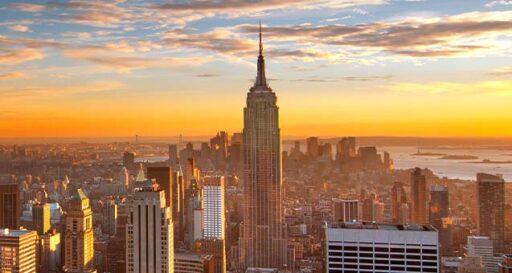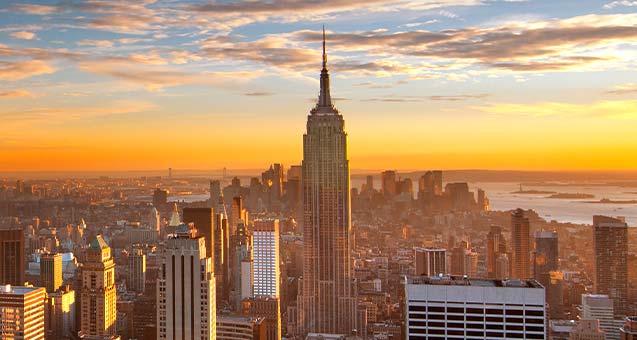Luxury Resort News takes an in-depth look at the latest report by Henley & Partners and New World Wealth, revealing the top 10 wealthiest cities in 2024. This comprehensive analysis uncovers the factors that contribute to the economic prosperity of these urban powerhouses, including New York City, London, and Tokyo.
Defining Wealth in a City
A wealthy city is characterized by its economic prosperity, high concentration of millionaires and billionaires, robust financial markets, advanced technology adoption, and significant population growth. Henley & Partners’ research delves into various factors, such as high-net-worth individuals, investments, residence options, and citizenship pathways, to determine the wealthiest cities globally. These indicators reflect a city’s competitiveness and capacity for innovation on the global stage
The Top 10 Wealthiest Cities in 2024
1. New York City, USA: Financial capital with a bustling stock exchange and real estate market.
2. San Francisco Bay Area, USA: High growth rate with 305,700 millionaires.
3. Tokyo, Japan: Hub for ultrahigh-net-worth individuals.
4. Singapore: Business-friendly with a growing number of millionaires.
5. London, UK: Strong financial services sector despite a slight decline.
6. Los Angeles, USA: Thriving financial markets and luxury lifestyle.
7. Hong Kong, China: Strategic location and low tax rates attract investors.
8. Beijing, China: Significant wealth in technology and finance.
9. Shanghai, China: Robust GDP and vibrant financial market.
10. Sydney, Australia: Emerged as a wealth hub with strong economic prospects.
As projected for 2024, the top 10 wealthiest cities globally are poised to be New York City, London, Tokyo, Hong Kong, Singapore, Los Angeles, Chicago, Shanghai, Beijing, and San Francisco. These cities exhibit significant wealth accumulation, host numerous millionaires and billionaires, boast thriving financial and technological sectors, and attract high-net-worth individuals seeking investment opportunities, residence options, and global connectivity.
New York City, known as the financial capital of the world, stands out for its bustling stock exchanges, top-tier investment banks, and prosperous real estate market.
London, home to a diverse economy and strong financial services sector, attracts wealthy individuals drawn to its stability and luxury lifestyle offerings.
Tokyo’s dynamic economy and advanced technological innovations position it as a hub for ultrahigh-net-worth individuals.
Hong Kong’s strategic location, low tax rates, and vibrant business environment make it a magnet for international investors and entrepreneurs.
New York City, USA
New York City is a global financial powerhouse, renowned for its concentration of wealth and bustling economic activities. The city’s wealth is deeply rooted in its history as a major port and trade hub in the 19th and early 20th centuries, which laid the foundation for its financial and cultural dominance. Today, Wall Street stands as the epicenter of global finance, attracting domestic and international investors. The iconic skyline, upscale real estate, and vibrant cultural scene draw millionaires and billionaires from around the world. From the glitz of Broadway to the serenity of Central Park, New York City’s blend of historic charm and modern luxury continues to captivate high-net-worth individuals.
London, UK
London, the capital of the United Kingdom, has a rich history dating back to Roman times. Its longstanding role as a center of commerce and trade has evolved over centuries, establishing it as one of the world’s leading financial hubs. The City of London, often referred to simply as “the City,” is home to major banks, financial institutions, and the London Stock Exchange. London’s strategic location, robust infrastructure, and legal framework attract global investors. The city’s diverse cultural offerings, from West End theatres to historic landmarks like the Tower of London, combined with luxury shopping districts such as Knightsbridge, make it a magnet for affluent residents and visitors alike.
Tokyo, Japan
Tokyo’s transformation from a small fishing village named Edo to a bustling metropolis is a testament to Japan’s economic miracle. After World War II, Tokyo rapidly rebuilt and grew into an economic and financial center. Today, it boasts a dynamic business environment with a strong emphasis on innovation and technology. The Tokyo Stock Exchange is one of the largest in the world, and the city’s investment climate is known for its stability and growth potential. Upscale neighborhoods like Ginza and Shibuya are renowned for luxury shopping and dining, attracting high-net-worth individuals seeking both traditional Japanese elegance and modern amenities.
Hong Kong, China
Hong Kong’s rise as a global financial hub is rooted in its history as a British colony and its strategic location as a gateway between the East and the West. The city’s status as a free market economy with low taxation and strong legal frameworks makes it highly attractive to investors. Hong Kong’s skyline, dominated by impressive skyscrapers, reflects its economic prosperity. The bustling Victoria Harbour, luxury shopping in Causeway Bay, and the financial district in Central all contribute to its allure. The city’s entrepreneurial spirit and pro-business environment continue to foster innovation and attract wealthy individuals.
Singapore
Singapore’s journey from a colonial trading post to a modern financial powerhouse is remarkable. Gaining independence in 1965, Singapore rapidly developed its infrastructure, legal framework, and economy. Today, it stands as a leading financial center in Asia, known for its political stability, low corruption, and efficient regulatory environment. The city-state’s robust economy, driven by finance, technology, and manufacturing, attracts global investors. Marina Bay Sands, Orchard Road, and Sentosa Island exemplify Singapore’s luxury lifestyle offerings. High-net-worth individuals are drawn to its world-class amenities, elite educational institutions, and vibrant cultural scene.
Los Angeles, USA
Los Angeles, often associated with Hollywood glamour, has a diverse economy that extends beyond the entertainment industry. The city’s wealth is supported by a strong financial sector, including major banks and investment firms. Its strategic location on the West Coast facilitates trade with Asia and Latin America, enhancing its economic opportunities. The affluent neighborhoods of Beverly Hills and Malibu, luxury boutiques on Rodeo Drive, and a thriving arts and culture scene make Los Angeles a magnet for high-net-worth individuals. The city’s blend of natural beauty and urban sophistication offers a unique lifestyle for the wealthy.
Chicago, USA
Chicago’s wealth and economic prowess are deeply intertwined with its history as a transportation and industrial hub. The city’s location on the Great Lakes and its extensive rail network made it a critical center for trade and commerce. Today, Chicago is a major financial hub, home to the Chicago Mercantile Exchange and numerous investment firms. Upscale neighborhoods like the Gold Coast and Lincoln Park offer luxurious living, while the city’s vibrant arts scene and renowned institutions like the Art Institute of Chicago attract affluent residents. Chicago’s diverse economy, including a growing tech sector, provides ample opportunities for investors.
Shanghai, China
Shanghai’s evolution from a small fishing village to one of the world’s most important financial centers is a story of rapid economic growth and modernization. The city’s strategic location on the Yangtze River Delta has made it a key player in international trade. Shanghai’s impressive GDP and vibrant financial markets, including the Shanghai Stock Exchange, attract global investors. The city’s blend of traditional Chinese culture and modern innovation is evident in its luxury real estate, high-end shopping districts, and cultural landmarks. Affluent individuals are drawn to Shanghai for its dynamic business environment and opportunities for wealth expansion.
Beijing, China
Beijing, the capital of China, is a city steeped in history and cultural significance. Its wealth and economic power are driven by its status as a political and financial center. Beijing’s robust economy spans various sectors, including technology, finance, real estate, and manufacturing. The city is home to major financial institutions and a dynamic stock exchange. Upscale areas like Chaoyang and luxury shopping in Sanlitun cater to the city’s affluent residents. Beijing’s rich cultural heritage,
Factors Contributing to the Wealth of These Cities
The wealth of the top cities is a result of several key factors including robust economic growth, high GDP per capita, strong financial and technological sectors, an attractive business environment, high standard of living, and global connectivity. These factors collectively contribute to the affluence and prosperity of these cities, making them attractive hubs for wealth accumulation and high-net-worth individuals.
Robust economic growth plays a pivotal role in propelling these cities towards prosperity and wealth. It creates opportunities for businesses to thrive, attracting investments and fostering innovation. The high level of GDP per capita signifies the economic well-being of the residents, reflecting their purchasing power and quality of life.
The strong presence of financial and technological sectors further enhances the wealth landscape of these cities. Financial institutions drive capital flow and support various industries, while technological advancements spur growth, efficiency, and competitiveness.
The attractive business environment fosters entrepreneurship, job creation, and overall economic dynamism. A high standard of living, characterized by quality healthcare, education, and infrastructural development, attracts affluent residents and skilled workforce.
Global connectivity, facilitated by robust transportation networks and digital infrastructure, enhances trade, tourism, and cultural exchanges, contributing to the cosmopolitan nature of these cities.”
Economic Growth
Economic growth plays a pivotal role in the wealth accumulation of cities, driving prosperity, attracting investments, and fostering a conducive environment for financial markets and technological advancements.
City wealth reflects the collective economic performance of businesses, industries, and individuals within its borders. When a city experiences significant economic growth, it not only boosts its Gross Domestic Product (GDP) but also improves the standard of living for its residents. This, in turn, enhances the city’s overall prosperity and competitiveness on a global scale, making it an attractive destination for domestic and international investors seeking opportunities for growth and returns.
In addition, the development of a robust financial sector within a city becomes more pronounced as economic activity expands. A thriving economy creates the demand for diverse financial services, leading to the establishment of banks, investment firms, and other financial institutions that support businesses and individuals in managing wealth, raising capital, and making investments. This financial infrastructure further stimulates economic growth and contributes to the overall prosperity of the city.
High GDP Per Capita
High GDP per capita indicates the economic prosperity of cities, reflecting the average income and wealth distribution within the population, influencing the financial markets and technological advancements.
When a city achieves a high GDP per capita, it signifies that its residents generally have higher purchasing power, leading to increased consumer spending and investment opportunities. This, in turn, fuels economic growth and development. A strong GDP per capita often correlates with higher standards of living, improved infrastructure, and access to quality healthcare and education.
Cities with high GDP per capita tend to attract more businesses and skilled labor, fostering innovation and entrepreneurship. The availability of resources and capital in such cities facilitates technological advancements, research, and development, driving progress in various sectors.
Strong Financial and Technological Sectors
Cities with robust financial markets and advanced technological sectors exhibit significant wealth due to increased investment opportunities, high-net-worth individual attraction, and continuous innovation driving economic growth.
These cities serve as thriving hubs for financial institutions and tech companies, offering a fertile ground for innovation and growth. The intersection of these sectors not only boosts the local economy but also attracts global investors seeking lucrative opportunities.
The synergy between finance and technology leads to the development of cutting-edge solutions, propelling these cities to the forefront of digital transformation and economic prosperity.
Attractive Business Environment
An attractive business environment in cities enhances wealth accumulation by offering diverse investment opportunities, attracting high-net-worth individuals, and facilitating global connectivity for economic prosperity.
Such environments create a magnet for investors seeking lucrative ventures and a conducive ecosystem for businesses to thrive. As high-net-worth individuals are drawn to areas with robust investment landscapes and favorable tax conditions, cities offering such amenities become hotbeds of economic activity.
The international connectivity provided by a well-developed business environment is crucial in today’s interconnected world, enabling companies to access global markets, establish partnerships, and drive innovation.
High Standard of Living
Cities with a high standard of living attract wealth and prosperity, offering residents a premium quality of life, luxury amenities, and superior living conditions conducive to wealth accumulation.
People gravitate towards these bustling urban hubs due to the allure of exquisite residential options, upscale dining experiences, and sophisticated cultural offerings that cater to their refined tastes.
The availability of top-tier healthcare facilities and renowned educational institutions further enriches the appeal of these cities, ensuring that residents can access first-class services and opportunities for personal growth.
The thriving job markets in such locations often provide lucrative career opportunities, facilitating higher income levels and financial stability for individuals eager to maximize their earning potential.
Global Connectivity
Cities with strong global connectivity serve as economic hubs, fostering wealth through international relations, business networking, and global economic integration, attracting investments and high-net-worth individuals.
This interconnectedness enables cities to capitalize on diverse opportunities brought about by a globalized economy, allowing them to access a broader range of markets and resources. Such connectivity not only enhances economic growth but also facilitates cultural exchanges and knowledge-sharing between nations, contributing to a vibrant and dynamic urban landscape. The seamless flow of information and resources across borders nurtures innovation and entrepreneurship, leading to the emergence of cutting-edge industries and the creation of job opportunities for local communities.
Frequently Asked Questions
What are the criteria used to determine the world’s wealthiest cities in 2024?
The criteria used in this report include investment opportunities, economic growth, political stability, quality of life, and the presence of high-net-worth individuals.
Which city is predicted to be the wealthiest in 2024?
According to the report, New York City is expected to be the wealthiest city in the world in 2024, surpassing cities like London, Tokyo, and Hong Kong.
What factors contribute to a city’s wealth?
A city’s wealth is influenced by a variety of factors, such as its economic growth, political stability, infrastructure, and the presence of major industries and businesses.
How will the COVID-19 pandemic impact the wealth of cities?
The pandemic has caused significant disruptions to global economies, and this may have a long-term impact on the wealth of cities. However, some cities have shown resilience and have been able to bounce back quickly.
Are there any new cities on the list of the world’s wealthiest in 2024?
Yes, the report predicts that cities like Dubai, Shanghai, and Singapore will see significant economic growth and become major players in the global economy by 2024.
What are some potential challenges that could affect the wealth of these cities in the future?
Factors such as political instability, natural disasters, and economic downturns can all have a negative impact on a city’s wealth. Additionally, rapidly developing cities may face challenges in managing their growth and maintaining their status as wealthy cities.
For a detailed analysis and more insights, read the full report by Henley & Partners [here](https://www.henleyglobal.com/newsroom/press-releases/wealthiest-cities-report-2024).
Subscribe today for the freshest car news delivered to your inbox




